Abu al-Muthanna refused to go to Raqqa with his friends in Liwaa al-Aqsa (al-Aqsa Brigade) because he rejects “ISIS’ oppression”. At the same time, he refuses to attack the group or deny that it has established “God’s law” on earth at a time when “revolutionaries” owe their loyalty to the “idolatrous” West and conspire with them to eradicate the “Mujahedeen” and destroy their project to establish a “Rightly-Guided Caliphate” in Syria, according to him.
“Abu al-Muthanna” is the organizational name of a young man in his twenties from the province of Hama. He did not complete his university studies because of the revolution. He first joined the peaceful movement of the Free Syrian Army, then joined Jund al-Aqsa and then the Islamic Party of Turkestan. He spoke to Enab Baladi through an intermediary who he finally accepted to deal with since he considers Enab Baladi “a secular newspaper that supports apostates and distorts the image of the mujahedeen”.
The ideology adopted by Abu al-Muthanna does not differ from that of a lot of Syrian young men. Indeed, it has become the norm and is not limited to specific jihadi groups. This ideology has become a threat to the foundations of Syrian society in regions both under and outside the control of the Syrian regime. Because of this ideology, Abu al-Muthanna made his young daughter a living bomb whose body exploded in one of the security centers of Damascus in order to “get closer to God”, as he put it. He even mercilessly killed his “apostate” father in the countryside of Idlib before joining the “Caliphate State” in Raqqa.
Those who follow extremist ideologies in Syria adopt the “Jihadi Salafist” school to dictate the conditions for peace and war. This includes the use of the laws of “al-walaa’ wa-l-baraa’” (a principle for determining whether people fall within or outside the fold of Islam) and “al-Hakimiyya” (the concept that only God is sovereign) to issue judgments on whether individuals are disbelievers or apostates, reject the legitimacy of governments that believe in democracy rather than “Islamic law” and fight these governments both secretly and publicly. The Syrian Revolution’s transformation from a peaceful movement to armed combat contributed to the formation of a fertile environment for the establishment of jihadist groups that adopt this ideology, making them a hub for combatants from all around the world.
Through this investigation, Enab Baladi seeks to identify the reasons behind the spread of extremism in Syrian society in general and in the “liberated” areas in particular. It also seeks to identify ways to address the impact and eliminate the negative ideas produced by them, through interviews with Syrian experts and researchers.
Jihadi Salafism
Jihadi Salafism is an Islamic movement that appeared in the 1980s. It is influenced by the ideas and writings of the Islamic author and thinker Sayyid Qutb in the 1960s and by Ahmed Ibn Taymiyyah, a thinker from Damascus who lived in the Mamluk era. It first emerged in the Republic of Egypt during the rule of the deceased President Anwar Sadat, who was assassinated on October 6, 1981 by officers belonging to al-Jama’a al-Islamiyya (the Islamic Group). This group is considered to be the first group to adopt this ideology, becoming a source for leaders and theorists of the Jihadi Salafist movement.
Jihadi Salafism differs from “Scientific Salafism” and the movements of political Islam such as the Muslim Brotherhood in that it asserts that “jihad” is “an individual duty for every Muslim”, emphasizes the obligation to “disobey rulers” who do not govern according to the principles of Islamic law, and stresses the need to follow the principles of “al-walaa’ wa-l-baraa’” and “al-Hakimiyya”.The theorists of Jihadi Salafism consider “al-walaa’ wa-l-baraa’” to be the most important pillar of the Islamic faith. It is a term that Ibn Taymiyyah proposed in his writings, considering it to be a condition of professing faith in Islam. Al-walaa’, or loyalty, means “supporting, loving, honoring, respecting and being with those who are beloved outwardly and inwardly”. Al-baraa’, or disavowal, means “staying away and disassociating from and hostility towards [individuals] after excusing and warning them”, according to the definition in the Encyclopedia of “al-Dorar al-Sunnia” (Sunni pearls).
However, Islamic intellectuals warned against extremism and exaggeration in interpreting these two pillars, “Having less than the required levels of loyalty is considered to be negligence, and what surpasses the allowed levels of loyalty is considered to be blameworthy exaggeration”, according to “al-Ghuluw fi-Deen” (Extremism in Religion), a book by the Saudi researcher Abdul Rahman al-Lwaiheq.
In his book, the researcher warns against five signs of extremism that began to spread among the followers of the Salafist movement, which are “exaggeration in the concept of the group, excessive sense of belonging to the group, exaggeration in making the group the source of truth, exaggeration of the leader, and exaggeration in rejection of Muslim societies”.
The principle of “al-Hakimiyya” is mainstream among groups that adopt the Jihadi Salafist ideology. This principle argues for certain positions towards the ruling, the ruler and state institutions based on Islam, and rejects acts of parliament and its prescribed laws and the Constitution of the country as they contain man-made laws that go against “Islamic law”.
Currently, the most prominent theorists of the Jihadi Salafist movement are Abu Muhammad al-Maqdisi, Abu Qatada al-Falastini and Hani al-Sibai, while its most prominent military commanders are Ayman al-Zawahiri (the al-Qaeda leader), Abu Bakr al-Baghdadi (the leader of ISIS), Abu Mohammed al-Joulani (founder of al-Nusra Front), and Abubakar Shekau (leader of Boko Haram).
Ignorance and emotional reactions against injustice
Most of those Enab Baladi interviewed agree that the spread of extremist ideology among the Syrian public is due to several reasons and accumulated factors, most notably lack of understanding, emotional reactions against injustice and the problems caused by many decades of governance by totalitarian regimes.
Sheikh Mohammed al-Khateeb, head of the religious law office of al-Jabha al-Shamiyya (the Levantine Front) in the province of Aleppo, sees ignorance as the main reason for the spread of the ideology and its continuity until today is unawareness. He said, “Ignorance is the greatest evil, it is the root from which all evil grows. All the tragedies we faced and all the problems that occurred in our revolution were caused by ignorance”. He explained, “The simple person who has no idea about extremist ideology and the difference between us and them (extremists) sees an image of them that is positive and beautiful, holding up the flag of Islam and the Islamic caliphate and applying Islamic rules and God’s law. So, to a simple person, their image is better than ours now, according to his standards.”
He added, “Those who are influenced by their ideology says: ‘They apply Islamic laws whereas we don’t, they command people to pray while we don’t, they impose the hijab while we don’t… What they don’t know is that the main flaw that differentiates between us and them (extremists) is the excommunication and murder of Muslims. This is the main point that we disagree with them on. We don’t disagree with them on many of the things they want to implement but we disagree with them over the method of application. The fundamental disagreement is the issue of murder and excommunication, this is what we should clarify for young people who are unaware.”
Al-Khateeb, who attended debates with leaders and religious jurists from ISIS in the past, stressed the fact that young people impulsiveness and their love for their religion help to spread “extremism”. He added, “When you see the vicious attack on Islam and Muslims, or unjustified Western statements that are hostile to Islam as a whole without differentiating between extremists and moderates, this leads to a backlash by passionate young people and to automatic hostility to anyone who disagrees with extremist ideology. They become hostile to all factions and every human being who is moderate. They tell you ‘People are being killed, bombed and crushed and you are talking about moderation’. This discourse is not popular with passionate young men”.
Liwaa al-Aqsa (al-Aqsa Brigade) is composed of fighters from the provinces of Hama and Idlib who belong to the Jihadi Salafism movement and support the ideology of al-Qaeda and ISIS. Some of them have secretly pledged allegiance to ISIS.
After the battle of “Marwan Hadid” started in the northern countryside of Hama In September 2016, 80 members of ISIS came to fight under the leadership of Liwaa al-Aqsa, most of them residents of the province. They were followed by ISIS leaders, the most prominent being Abu al-Wakeel al-Iraqi, considered to be the main agitator behind recent events and field executions carried out by the jihadi faction in rural Hama and Idlib and which affected about 200 opposition fighters.
The faction has fallen apart, with some pledging allegiance to Hayat Tahrir al-Sham (Organization for the Liberation of the Levant) while others joined the Turkistan Islamic Party. The majority retreated towards ISIS-held areas in the eastern regions of Syria. Most of the factions mentioned follow the Jihadi Salafist movement.
The head of the religious law office clarified that young men who are attracted by extremism are excessively impulsive and emotional, and want an immediate way to see “the victory of Islam” with minimal losses and in the shortest time possible. He continued, “When you talk to them calmly, compassionately and gradually, they tell you, ‘Do you want me to spend many years focusing on education and raising the next generation?’. So he finds the passion he feels in the exaggerated discourse of ISIS, when they say ‘We are going to take over the world, destroy the cross and fight disbelievers’. So he finds something inside him pushing him towards this discourse and he goes along with it.”
Sheikh Esmat al-Absi, head of the Courts of Justice in Horan, operating in the provinces of Daraa and Quneitra, explained that the environment of war and killing creates a tendency towards emotion, a fertile ground for extremist ideas. Al-Absi explained that one of the most important factors is also “the absence of a clear national project that unites everyone”, which leads “some young men to go towards an extremist project that they view as a way of fighting against tyranny and the global imperialist project”. Al-Absi cited a saying by a companion of the Prophet Mohammed, Omar ibn al-Khattab, who said,”These hands were created (by God) to work; if it they are not kept busy in obeying God, they will be used for disobedience”.
Dr. Mohammed Eskaf, a human rights activist in rural Idlib, has another view. “Even if ISIS is destroyed and expelled from all Syrian territory, we would still face similar groups in the future that would be stronger and more ferocious than ISIS, which was considered a breakthrough in terms of strength and organization in the world of Islamic extremist groups.”
Eskaf clarified that the issue lies in addressing causes not phenomena. He said, “We as Syrians – and the international community as well – first have to understand the causes and then we have to address them at their root”. He added, “In terms of causes, we can mention dictatorial regimes at the top of the list which gave these extremists the huge capacity to brainwash and made them convinced them that their actions are holy. Those regimes, foremost among them the Syrian regime, have constantly sought to spread ignorance and have used these extremists to spread evil. These regimes have always tried to portray themselves as the only hope and savior from the terrorism of these extremists. Anyone who looks closely can see that the presence of these movements is clearly linked to the existence of dictatorial regimes. To get rid of them, we must destroy them both.”
The human rights activist added, “For me, throughout the years of the revolution, which is about to enter its seventh year, I have seen a lot of friends, intellectuals and elites who left the revolutionaries and joined these movements, mainly ISIS. When examining in-depth the reasons that led them to do so, we find that the main reason is the desire for revenge and the impulse to be on the side of the stronger party. There are several other reasons as well. Many of these cases are mostly about a love of suicide.”
Abu al-Walid al-Hamawi, a former commander of a faction in the Free Army in rural Hama, summed up extremist ideology as “similar to an epidemic that cannot easily be cured”. He said, “Extremism remains widespread in many cases, the most serious one being the cells that ISIS planted to carry out its criminal acts against security. Some of these cases involve people who adopt or support extremist ideology and who want to cut off the head of someone they used to hate, and those who admire the sheer power of ISIS in some of its battles against the Syrian regime. Some are related to an ISIS fighter who brainwashes them with their poisonous extremist ideology.”
Al-Hamawi, who witnessed the recent events of Liwaa al-Aqsa in the countryside of Hama and Idlib, considers the most important causes of the spread of extremism to be “the lack of preachers of moderate thought and of the real Islam in liberated areas. Where they are present, fighters distrust them due to the fragmentation of factions with the same ideological background, and their inability to form a unified umbrella”.
A unifying umbrella to prevents extremism
The only possible solution to ward off the dangers and increasing prevalence of this phenomenon, particularly in the liberated areas, is to form a political, economic and intellectual unifying umbrella to face the ISIS group and its media machine used to spread its alien ideas.
As an example, Sheikh Esmat al-Absi clarified that the judiciary in “liberated” Daraa addresses manifestations of extremist ideology and this forms an important part of the Court of Justice’s work on the judicial and legal aspects of this issue. However, according to him, a security solution is not sufficient. Psychological, social and economic solutions are needed from all aspects, “We must start by resolving the causes of extremism and then addressing extremist ideology so that we can eliminate all its roots.” The only possible solution to ward off the dangers and increasing prevalence of this phenomenon, particularly in the liberated areas, is to form a political, economic and intellectual unifying umbrella to face the ISIS group and its media machine used to spread its alien ideas.
Al-Absi considers that young people who have been arrested and punished in prison and subjected to religious legal sessions also need psychological treatment. He said, “One can clearly see that the ideology of extremism, overzealousness and criminal acts reach the level of sadism. Psychological treatment is needed for those whose brains have been contaminated with this ideology.”
Judge al-Absi, who faced several failed assassination attempts, which the Jaysh Khaled Ibn al-Walid group (which is close to ISIL) was accused of being behind, revealed that, separately from his job in the Court of Justice, he carries out religious outreach work in this field. He said, “Aside from our judicial role, we are members of several preaching organizations, which raise awareness among young people, the Mujahedeen and society in general of the dangers of ISIS and extremism and of the fact that our religion is moderate and pure… We are keen to keep the revolution pure and with a moderate Islam. We are not supporting certain groups against others. We went out to protest against tyranny, injustice as well as extremism, which is considered another form of injustice.”
Eliminating ignorance and forming an umbrella that could be an effective substitute for ISIS are the solutions proposed by Sheikh Mohammed al-Khateeb, head of the religious law office in al-Jabha al-Shamiyya. He said, “The solution to the problem of extremism lies in eliminating its causes and raising awareness. When a young man gains correct and proper knowledge, he will abandon many wrong ideas that were planted in his mind and move away from this issue and the doubts that need to be cleared up. Spreading knowledge, addressing doubts and debating with extremists are the main ways to make many young men move away from extremism.”
While discussing solutions to the extremism phenomenon, al-Khateeb said, “We must provide an alternative. So far, we do not have an alternative. We are dispersed across fragmented and conflicting factions. When someone sees this bitter reality, he turns to ISIS since he sees it as an organized movement with one leader that controls vast areas. If we do not provide an alternative, we will be a factor in these young men going astray”.
The head of the religious law office in al-Jabha al-Shamiyya revealed that, in this context, they are working on several levels, “The first is the religious law office and religious education of the military factions. This level works on demonstrating the extremists’ flaws and the differences between them and us, what is our approach and what is theirs. The second level deals with prisoners who were part of ISIS or who wanted to join it. We are working on raising their awareness through religious education sessions to wash away their extremist ideology and to bring them back to their original and pure Islamic roots.”
According to the leader Abu al-Walid al-Hamawi, solutions to this phenomenon do exist despite the difficulties in implementing them. He said, “On the security level, it is crucial to deal with poisonous entities and cells that stayed here to execute ISIS’ agenda such as bombings and assassinations of leaders and preachers. On the religious level, it is essential to start by providing security protection to trustworthy religious scholars, and then invite these scholars to be present all the time to fill the void that allowed the spread of extremist ideology.”
Tales of extremism in the liberated areas of Syria
Doctor and human rights activist Mohammed Eskaf told Enab Baladi the story of his friend from Hama, who ended his life by setting off a car bomb. The doctor said, “My friend was one of the first people to take up arms in the city. He emigrated at the beginning of 2012 to the northern countryside of Hama. In May 2013, his new home was targeted by a missile strike by Syrian regime forces. As a result, he lost his two children and his wife was seriously injured but later recovered.”
“After that incident, my friend’s way of thinking changed completely and he started talking about the need to kill all the Syrian regime’s supporters and even their families. As the days passed and with the increasing propaganda churned out by ISIS’ media machine, my friend moved to the areas under ISIS control. In 2014, I saw him in a video clip driving a car bomb targeting the Kurdish Autonomous Administration forces in the outskirts of al-Hasaka.” Eskaf stressed that his friend’s extremism was not the result of a void, “Someone pushed him towards all this hatred. The sight of his children’s remains being carried in front of his eyes was enough to be a cause for his extremism, but not a justification.”
“Daeshi” extremist ideology exists in abundance in areas where there is a lack of religious education and awareness-raising sessions including areas of Free Army factions in Hama, Idlib and Aleppo. According to Abu al-Walid, the number of such sessions is smaller in ideologically indoctrinated factions. Al-Walid told Enab Baladi the story of three friends in the countryside of Idlib who were united during the revolution and killed due to extremism. One of them was a combatant in Liwaa al-Aqsa, the second was part of Hayat Tahrir al-Sham and the third never even held a weapon.
When clashes between Liwaa al-Aqsa and Hayat Tahrir al-Sham intensified, the first friend killed the second during fighting. Right before leaving for Raqqa with his faction last month, he arranged to meet the third friend and assassinated him in cold blood. According to al-Walid, this story caused a stir in the southern countryside of the province.
“A.H.”, a young man in his twenties from Hama, fought in a group led by his uncle, which belonged to the Ahrar al-Sham Movement. He then moved to Liwaa al-Aqsa in Khan Shaykhun. Sources told Enab Baladi that the young man has a bad reputation in northern Syria, having unlawfully confiscated civilians’ belongings. He married five women and left them behind without divorcing them last month when he left for Raqqa.
Enab Baladi obtained an audio recording in which the young man threatens to kill leaders of the Free Army in Hama, including his own uncle, as well as Abu Mohammed Joulani, the military commander of Hayat Tahrir al-Sham. The young man describes every one of these people as “apostate mercenaries”.
When asked whether he missed his family, who were displaced from the countryside of Hama to a city currently under the Syrian regime’s control, Abu al-Muthanna, the young man who was part of Jund al-Aqsa, answered (via the mediator), “I’m afraid that they may have become apostates. I wish I could enter the city as a conqueror with the Mujahedeen to urge them to repent. Living a happy life under the rule of a Kafir (apostate) regime means loyalty to this regime and they must disown it”. His words contained several terms that the young man in his twenties had never come across at his university or home, before Syrian society became divided. Will the efforts of those working to eliminate “Daeshi” extremist ideology succeed? Or will success have to wait until the departure of the Assad regime?
The origins of evil: fundamentalism and extremism
Omar al-Khateeb – Syrian writer and journalist
I think that the term “Daeshi” or “ISIS ideology” is a misleading one as it is used to distance society from this ideology and claim that it is alien to us. What is clear is that it is the tools and techniques used by ISIS that are alien to Syrian society. We must distinguish between their thought and their actions in order to understand the secret behind the spread of the former and the rejection of the latter.
Today, the most popular ideology is fundamentalism, which some like to refer to as “extremism”. Thus, in order to understand the reason behind the spread of this ideology, we must start by understanding the mechanisms and dynamics behind the spread of fundamentalist thought. The spread of fundamentalism is linked to many factors, including self-defense against the ideas and values of the more developed “other”. Poverty, despair and marginalization are considered as major factors but they are not essential. Fundamentalist ideas have attracted many among the wealthy, university graduates and people of higher social class.
ISIS’ ideology did not emerge in the liberated areas but rather found a space in these areas to carry out its activities and to announce itself. Fundamentalist ideas already existed in all societies and in all religions, but only revealed themselves in an elitist manner or remained in private circles. They need specific conditions in order to emerge openly as a public social phenomenon.
It is known among academics that fundamentalism in the Arab world first appeared at the beginning of the last century as a reaction to Western invasion, especially on the level of culture and values. As such, it was considered a direct threat to Arab society and its traditions. Fundamentalism was a response to this invasion and a way to defend Arab identity.
However, its huge expansion and emergence in the form of movements and groups started in the 1970s. This was linked essentially to the Arab regimes that promoted it and worked to reinforce nationalistic and religious xenophobia. Surprisingly, regimes that were supposed to be “secular” were the ones that supported these fundamentalist movements the most, in order to control societies by creating delusions and fears of infighting.
Like other fundamentalist movements, ISIS is using the most advanced modern technologies achieved by human civilization in all fields, especially in communications – contrary to the popular perception. Thus, it uses modern tools to express itself and spread its ideas. ISIS exploits the uncertainty in Syria and the multiplicity of discourses and ideologies to present simple responses to problems. Their solution is to declare others disbelievers and eliminate them, while telling their followers that they are the only ones who possess the truth and that they are perfect and flawless, while the problem is with others. Such ideas are easily accepted and adopted.
Confronting the spread of ISIS is closely linked to eliminating the causes for its existence and power. In Syria, it is not possible to defeat ISIS without first eliminating the roots of the evil – the Assad regime. With the end of the regime, many of the elements of despair and uncertainty will end. The more hope rises the less influence ISIS will have. This is in relation to actions. However, fundamentalism as a set of ideas will remain, but it will be possible to engage it in dialogue in order to reach a common social understanding.
if you think the article contain wrong information or you have additional details Send Correction
النسخة العربية من المقال
-
Follow us :











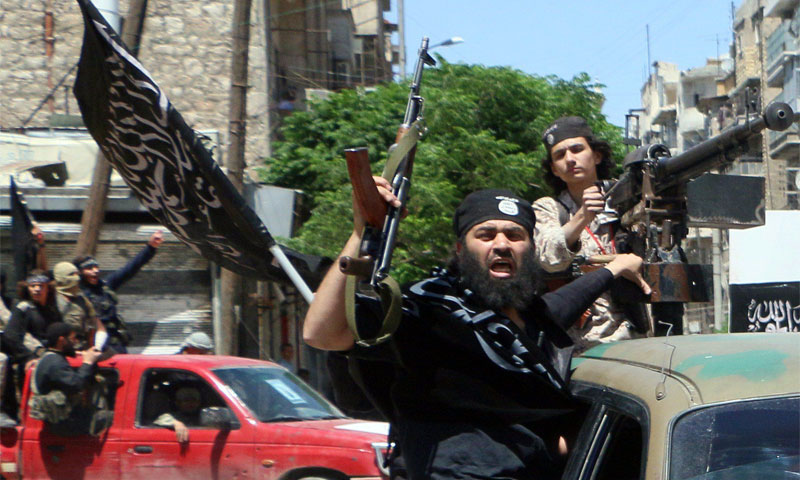
 Members of al-Nusra Front in Aleppo, May 26, 2015 (AFP)
Members of al-Nusra Front in Aleppo, May 26, 2015 (AFP)





 A
A
A
A
A
A

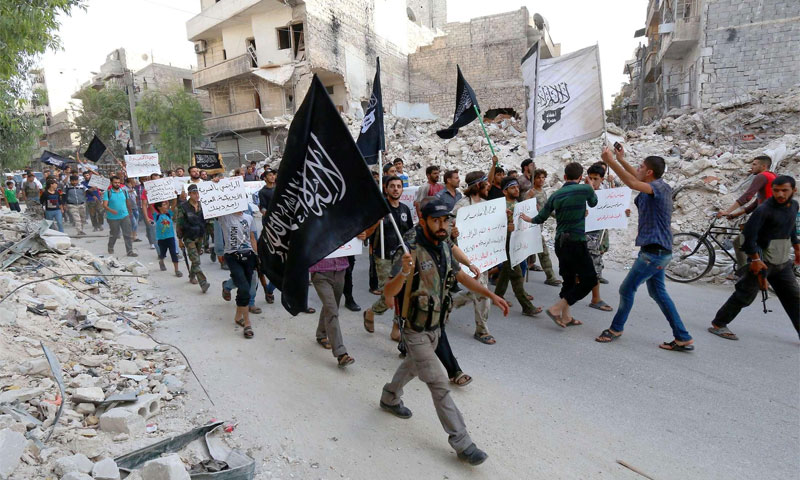
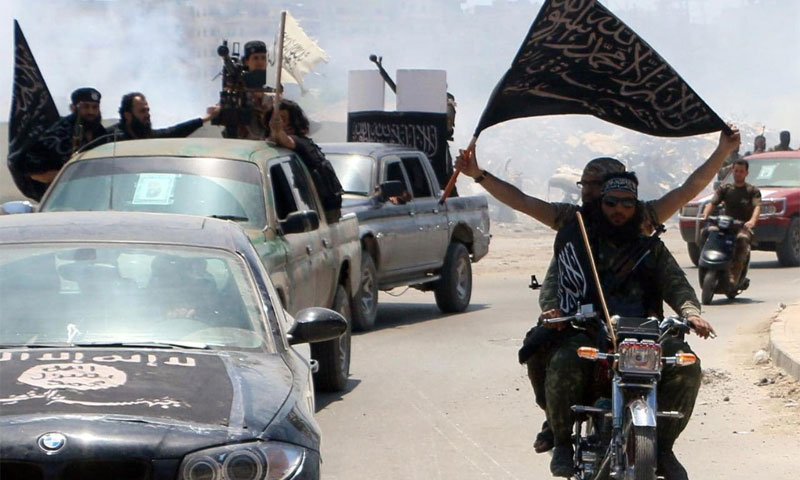
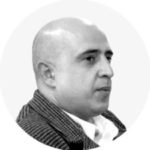


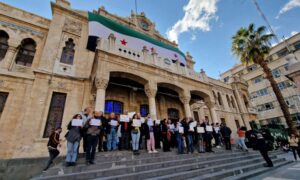
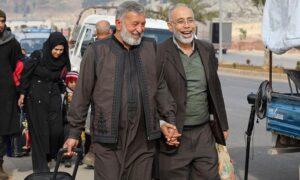
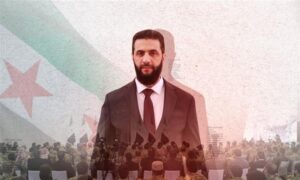
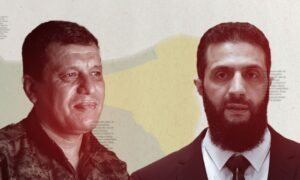

 More In-Depth
More In-Depth